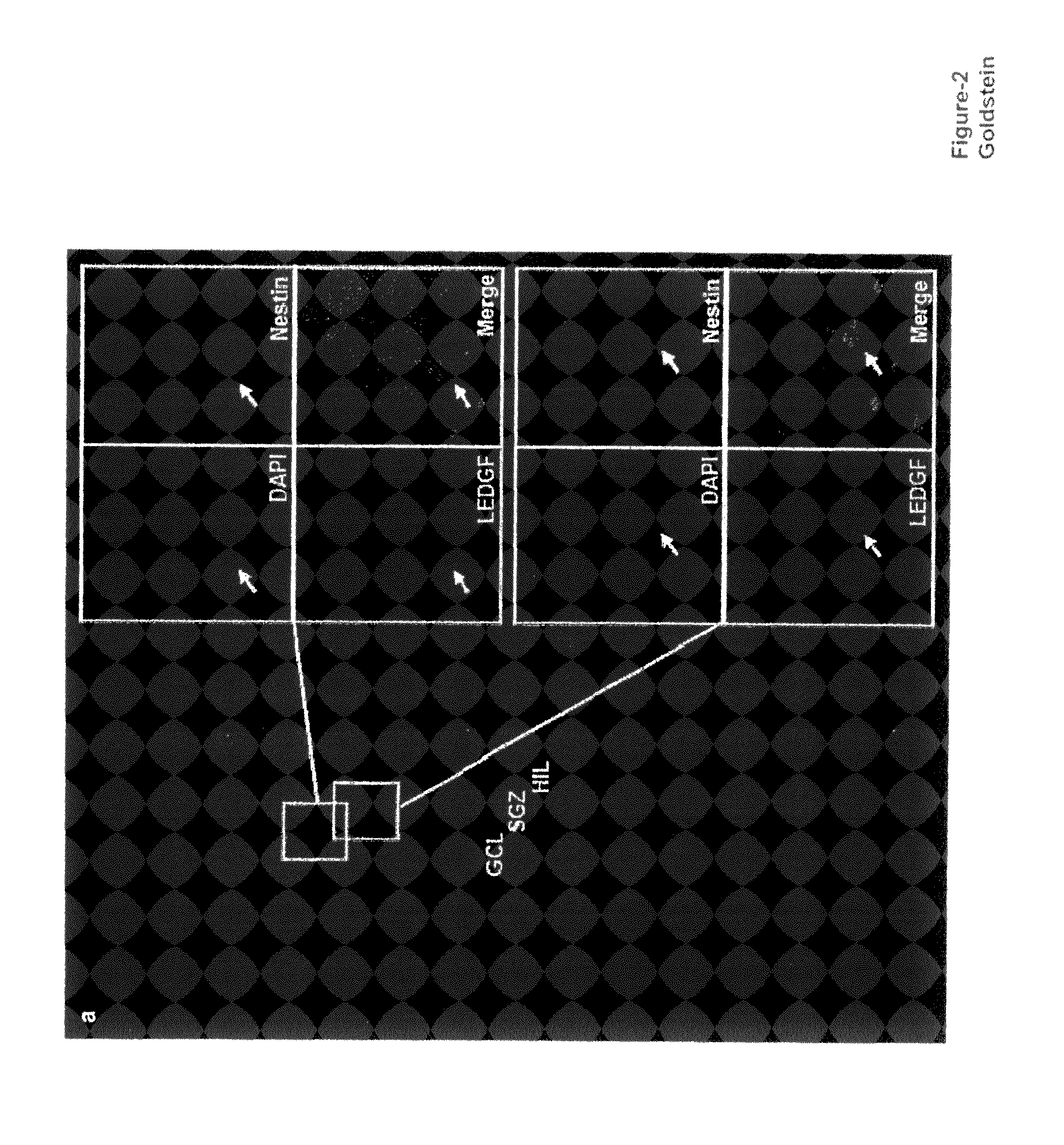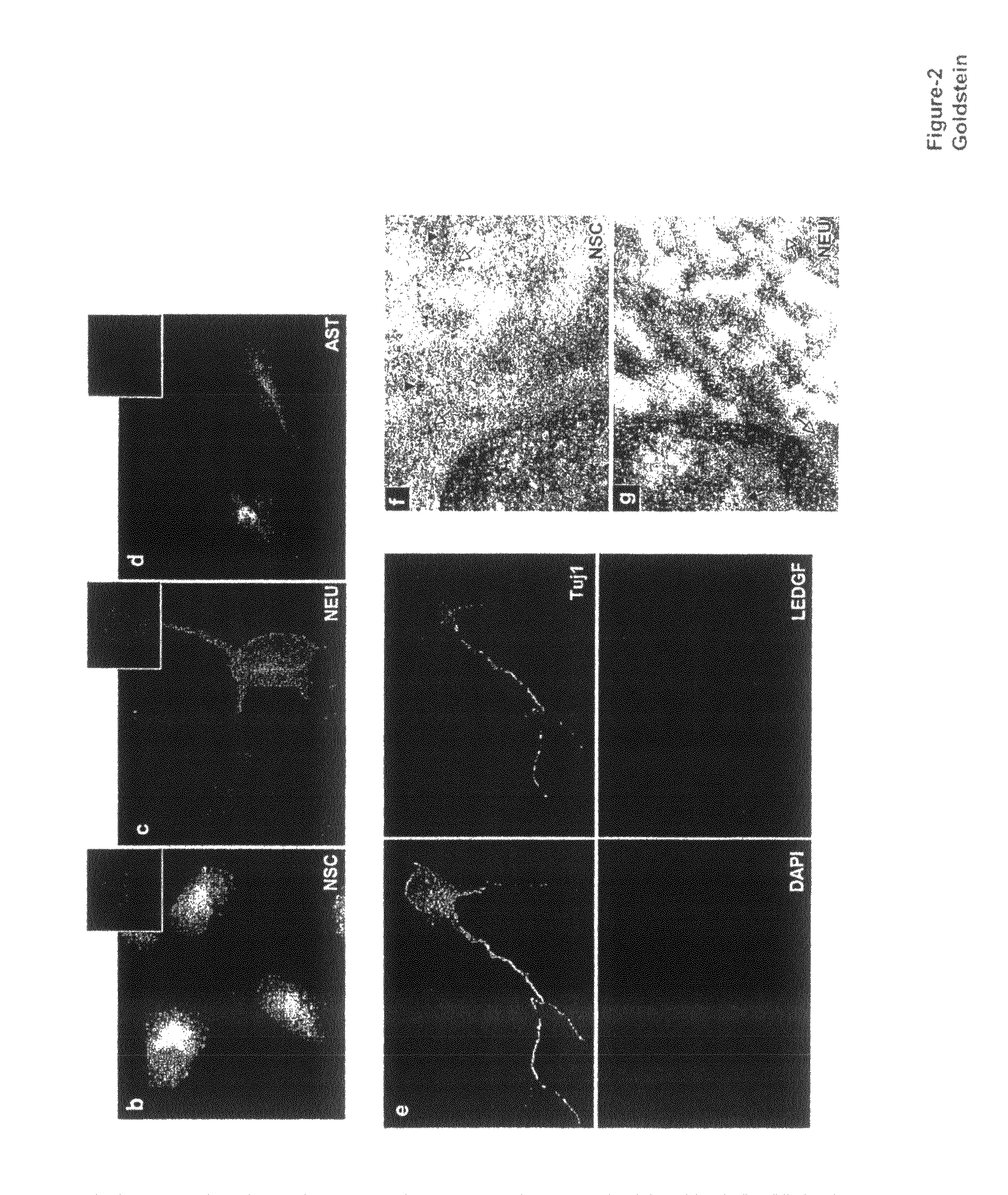Compositions and methods for diagnosing tumors using LEDGF/p75
a technology of ledgf and tumors, applied in the field of stem cell biology and cancer biology, can solve the problems of incomplete definition of the molecular mechanisms that mediate these functions, and achieve the effect of improving the diagnostic accuracy and reducing the risk of cancer
- Summary
- Abstract
- Description
- Claims
- Application Information
AI Technical Summary
Benefits of technology
Problems solved by technology
Method used
Image
Examples
example 1
Cell Culture and Transfection
[0087]Primary NESC cultures were prepared as previously described. (See Bonni, et al., Science 278:477-83 (1997); and Johe, et al., Genes Dev 10:3129-40 (1996)). Briefly, cortical cups were dissected from frontal cortices harvested from Long Evans rat E14 embryos, mechanically triturated, and washed in HBSS (Hanks' Buffered Saline Solution). Pellets were presuspended in Basal Medium Eagle (Sigma) supplemented with 1×N2 supplement (Invitrogen), 3.5% 1M glucose, 1% penicillin / streptomycin / glutamine (Invitrogen), and 20 ng / mL bFGF (R&D) and plated on polyornithine and fibronectin-coated surfaces.
[0088]Cells were treated with 10 ng / ml bFGF every 24 hours and passaged approximately every three days. Cells were used at passage three for all experiments. SY5Y cells were cultured in Dulbecco's modified Eagle's medium (DMEM) containing 10% FBS, penicillin-streptomycin (Invitrogen). LEDGF / p75 siRNA Oligo (siRNA duplex) was synthesized from (DHARMACON). Cells were ...
example 2
Short Hairpin RNAs (shRNAs)
[0090]pLL3.7, a lentiviral shRNA vector, was provided by the MIT Cancer Institute. The annealed oligonucleotide sequences are listed in Table 5.
[0091]
TABLE 5SEQIDPrimerSequenceNO:ChIPs and transcript analysis on CREB promoter:Primer 1_forAGA CTT GAA ACC CCA AGG AG1Primer 1_revTTC TTT CCT CAG CCT GTT TTC2Primer 2_forAGA CTT GAA ACC CCA AGG AG3Primer 2_revTGG CCC CGA TAC TGT GGC AC4Primer 3_forACC CGT CCC CAC GGG GGT CCC5Primer 3_revGAA CTT TCC GAC GCC GCC GGG A6Primer 4_forAGA AAC CCG AAG GTC TTC GGC7Primer 4_revGGA TCT CGC TGG AGT TTT ATT8RT-PCR on rat LEDGF / p75 gene:RT-PCR_forGCAGCAACCGCTTCTAATGT9RT-PCR_revCCTTTTGGCCTTCTTCCTCT10Real Time RT-PCR on rat LEDGF / p75 gene:RT-PCR_forCTC GCG ATT TCA AAC CTG GAG A11RT-PCR_revTTT GGT TTG CCA TAC TTT TCC T1218S ribosomal subunit:RT-PCR_forACG GAA GGG CAC CAC CAGG A13RT-PCR_revCAC CAC CAC CCA CGG AAT CG14Construction of the pcDNA-LEDGF / p75:pcDNA-CGGAAACATGACTCGCGATTTC15LEDGF / p75_forpcDNA-GTATGTCAACCTAGTTATCTAGT16LEDG...
example 3
Chromatin Immunoprecipitation (ChIP) Analysis
[0093]ChIP assay was conducted using a commercial kit (Upstate) on cell lysate extracted from SY5Y cells (LEDGF / p75-overexpressing, or LEDGF / p75 knockdown) in accordance with the manufacturer's protocol. SY5Y cells were transiently transfected with pcDNA with pEGFP, or LEDGF / pcDNA with pEGFP plasmids for 36 hours, respectively, or infected with LEDGF / p75i lentivirus for 3 days before cells were cross-linked with formaldehyde for ChIP analysis. Independent IP reactions were carried out with LEDGF / p75 antibody (BW 095, 1:200) and IP control reactions with anti-GFP antibody as a negative control, respectively. ChIP DNA were PCR-amplified using primers covering potential LEDGF / p75 binding sites within the indicated regulatory regions. Purified input chromatin was also used to perform parallel PCRs with all primer pairs. Primers for the human CREB 5′ UTR promoter region are listed in Table 5.
PUM
| Property | Measurement | Unit |
|---|---|---|
| time | aaaaa | aaaaa |
| time | aaaaa | aaaaa |
| time | aaaaa | aaaaa |
Abstract
Description
Claims
Application Information
 Login to View More
Login to View More - R&D
- Intellectual Property
- Life Sciences
- Materials
- Tech Scout
- Unparalleled Data Quality
- Higher Quality Content
- 60% Fewer Hallucinations
Browse by: Latest US Patents, China's latest patents, Technical Efficacy Thesaurus, Application Domain, Technology Topic, Popular Technical Reports.
© 2025 PatSnap. All rights reserved.Legal|Privacy policy|Modern Slavery Act Transparency Statement|Sitemap|About US| Contact US: help@patsnap.com



